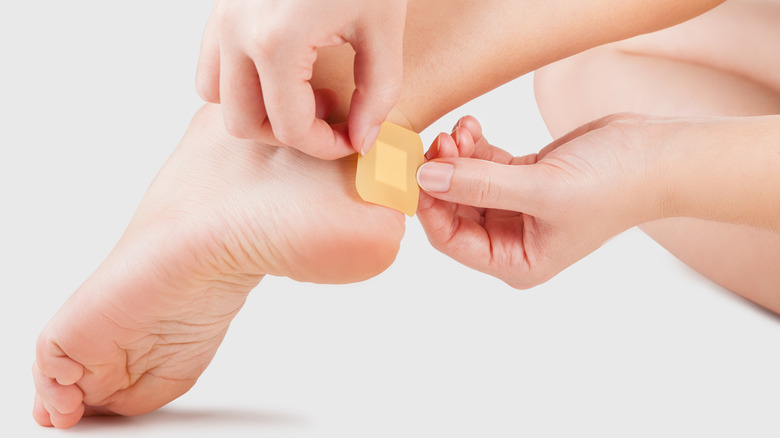What To Do When You Have A Blood Blister
Blisters, or pockets of fluid that form under the skin, can be uncomfortable and painful (via Cleveland Clinic). They can form as a result of injury or friction to the area. When the blood vessels around the injured area also become damaged, the blister becomes filled with blood instead of fluid.
According to Healthline, blood blisters tend to form in areas of your body that experience pressure, such as your feet, hands, and bonier areas of the body, like your toes and heels. They are usually caused by the skin being pinched hard, but not hard enough to break. They can also form as a result of participating in sports, wearing shoes that don't fit well, or even repeatedly using a tool that rubs against your skin, such as a hammer. The Family Foot Care Center reports that, in general, blood blisters will heal on their own within a week. However, you should still take steps to reduce the risk of infection and ensure that they heal properly.
Resist the urge to pop your blister
Although the inclination might be to pop a blood blister the minute it forms, the Advanced Foot & Ankle Centers of Illinois advises against going that route. Breaking a blister can increase your risk of an infection or a scar. If the blister is very large and causing you discomfort, it's best to leave it to a healthcare professional. However, in most cases, you should bandage the blister and try to reduce the amount of friction and pressure around it. You should also try and keep the blister elevated after it develops and apply ice to reduce the swelling (via Cleveland Clinic).
If you have a blood blister that doesn't heal within a week or if it seems like it has become infected, you should reach out to your doctor. Signs of infection include red, swollen skin, and white or green pus inside the blister instead of blood. You should also contact a doctor if you have a blood blister in an unusual place, such as your eye, mouth, or genitals, or a blister that keeps returning. Overall, blood blisters are not typically a cause for concern. However, it's always best to be vigilant and keep a close eye on anything that seems out of the ordinary.


